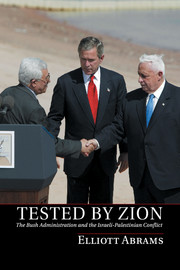Book contents
- Frontmatter
- Contents
- Acknowledgments
- Introduction
- 1 Early Days
- 2 9/11 and the Search for a Policy
- 3 Roadmap to Disengagement
- 4 “New Realities on the Ground”
- 5 Arafat, Disengagement, Sharon
- 6 Olmert – Peace or War?
- 7 War in Lebanon – and Condi
- 8 From Mecca to Annapolis
- 9 The “Meeting” at Annapolis
- 10 Two Trips to Jerusalem
- 11 Final Days in Gaza and Turtle Bay
- 12 Lessons Learned
- 13 Conclusion
- Index
- References
8 - From Mecca to Annapolis
Published online by Cambridge University Press: 05 January 2013
- Frontmatter
- Contents
- Acknowledgments
- Introduction
- 1 Early Days
- 2 9/11 and the Search for a Policy
- 3 Roadmap to Disengagement
- 4 “New Realities on the Ground”
- 5 Arafat, Disengagement, Sharon
- 6 Olmert – Peace or War?
- 7 War in Lebanon – and Condi
- 8 From Mecca to Annapolis
- 9 The “Meeting” at Annapolis
- 10 Two Trips to Jerusalem
- 11 Final Days in Gaza and Turtle Bay
- 12 Lessons Learned
- 13 Conclusion
- Index
- References
Summary
Intense fighting between Hamas and Fatah continued during January 2007, and there were especially heavy clashes in the first four days of February. Each side set up roadblocks, kidnapped people from the other party, attacked the other's strong points, and executed people whom they captured. There were occasional truces, which were soon violated as more murders followed a few hours of calm. Arab television viewers were still seeing plenty of violence in Gaza and some in the West Bank, but it was not Israeli-Palestinian violence; the bloodshed they were now seeing was Palestinian on Palestinian. The Israelis were spectators to this fighting and no doubt turned a blind eye when Fatah forces in Gaza were sent additional weapons or ammunition from the West Bank. Fatah and Hamas seemed evenly matched, or at least neither side appeared to have much of an upper hand; perhaps we and the Israelis should have been more startled by this because on paper, Hamas was greatly outnumbered. Such fighting certainly met any test the Israelis put to the PA on whether it was fighting terrorism and seeking to dismantle terrorist groups, as the Roadmap required. Whatever its motivation, the PA was acting.
This action laid a foundation for possible negotiations, though the Israelis and we – and the Quartet, at least in principle – were still nervous about the prospect of a Palestinian national unity government that might follow a truce. But Abbas had assured us that negotiations with Hamas were finished, and the violence we saw suggested such hostility that a coalition government was increasingly unthinkable.
- Type
- Chapter
- Information
- Tested by ZionThe Bush Administration and the Israeli-Palestinian Conflict, pp. 212 - 243Publisher: Cambridge University PressPrint publication year: 2013



